|
|
|
Sort Order |
|
|
|
Items / Page
|
|
|
|
|
|
|
| Srl | Item |
| 1 |
ID:
142481
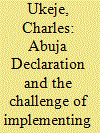

|
|
|
|
|
| Summary/Abstract |
Over the past two decades, the significance of the Gulf of Guinea and the wider South Atlantic Ocean has become incontrovertible in view of the spectrum of geo-strategic interests – commercial, energy, military, security and political – converging within the zone. Due to its vastness and lack of capacity to exercise adequate writby littoral states, the maritime landscape have become some of the most dangerous in the world: with frequent incidences of piracy, oil bunkering, trafficking in persons, weapons, illicit drugs and fake pharmaceutics, and criminal activities that are undermining maritime safety and security. A major debate is now brewing- in scholarship as well as in public policy circles- on the implications of developments in the maritime domain for security and development in Africa; including those around the challenges and opportunities facing Gulf of Guinea countries. Drawing on the insights as well as outcomes of a major conference on ‘African Approaches to Maritime Security: The West and Central African Perspectives, this article reviewed the challenges and opportunities that West and Central African countries face in view of the threats posed from, and by, their maritime domains; and their implications for governance, security and development. It further examined the prospects for the emergence of a putative maritime security community in the Gulf of Guinea, and across the South Atlantic.
|
|
|
|
|
|
|
|
|
|
|
|
|
|
|
|
| 2 |
ID:
138019
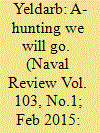

|
|
|
| 3 |
ID:
146295
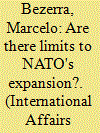

|
|
|
|
|
| Summary/Abstract |
THE EPICENTER of the earthquake that shatters Ukraine is located far beyond its dilemma of economic integration with the European Union or the Eurasian Union headed by Russia. The international dimension of this crisis (about which much has been already said in the post-Soviet epoch) concerns the defense and security issues or, to be more exact, the North Atlantic Treaty Organization's expansion to the east of Europe so that to tip the balance of power with Russia. This time NATO's persistent efforts at the borders of Russia produced two important events - an armed opposition in pro-Russian Donbass and reunification of Crimea with Russia, an event of historic consequence. This means that the project NATO is realizing in Ukraine as part of its security doctrine destabilized European security.
|
|
|
|
|
|
|
|
|
|
|
|
|
|
|
|
| 4 |
ID:
144129
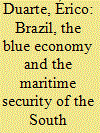

|
|
|
|
|
| Summary/Abstract |
This paper points out that the Brazilian emerging maritime approach is a remarkable change in its post-Cold War era's defence policy. The constraints of the US regional hegemony in the American continent resulted in a reactive defence policy throughout the twentieth century and its division from Brazilian foreign policy. Although the regional systemic conditions of powers remain in the twenty-first century, the ‘Atlantic energy renaissance’ promises to burst Brazilian social-economic development. Because the emerging Southern Atlantic Blue Economy is an event of global impact, Brazil is proactive to an expected growing contest for energy and resources in the region. That explains the institutional reforms in the Brazilian armed forces, the emphasis on coastal defence, the new agenda for West Africa, and the new push in the Zone for Peace and Cooperation of the South Atlantic. This offers a historical background of that change, assesses its main aspects and challenges, and concludes with some recommendations.
|
|
|
|
|
|
|
|
|
|
|
|
|
|
|
|
| 5 |
ID:
184557
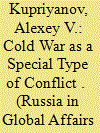

|
|
|
|
|
| Summary/Abstract |
Russian, Chinese, and Western scholars refer to the current confrontation
between the United States and China as Cold War 2.0. However, it remains
only a figure of speech used to emphasize the global nature of the conflict.
This article proposes to rationalize the analysis of the Cold War as a systemic
phenomenon requiring the development of a specific strategy and tactics.
This is a difficult task, since any Cold War suggests a long-time span, with no
possibility for crushing the enemy with a rapid offensive. By way of example,
this article outlines a possible naval strategy for Russia.
|
|
|
|
|
|
|
|
|
|
|
|
|
|
|
|
| 6 |
ID:
122182
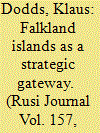

|
|
|
|
|
| Publication |
2012.
|
| Summary/Abstract |
The UK-Argentinian dispute regarding the sovereignty of the Falkland Islands has been central to public debate in this the 30th year since the Falklands War. Less well known, however, are the strategic challenges facing the UK in managing its Overseas Territories in the region, to which the Falklands are a 'strategic gateway'. Klaus Dodds surveys the rationales underpinning current UK policy regarding the South Atlantic and Antarctic Overseas Territories - sovereignty, security and stewardship - and addresses the implications for regional geopolitics of the recent saga involving the proposed merger of the British Antarctic Survey and National Oceanography Centre.
|
|
|
|
|
|
|
|
|
|
|
|
|
|
|
|
| 7 |
ID:
057461
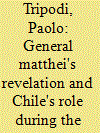

|
|
|
| 8 |
ID:
151321
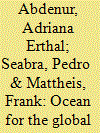

|
|
|
|
|
| Summary/Abstract |
In this article, we analyse an instance of revitalisation of a dormant interregional organisation dating back to the Cold War: the Zone of Peace and Cooperation of the South Atlantic (ZOPACAS), initially launched by South American and African states in 1986 through the UN General Assembly. Drawing on the concepts of “consensual hegemony” we argue that the current phase of ZOPACAS’ existence is characterised by Brazil's efforts to rekindle it, thus reflecting its aspiration to create a new space of influence. Rather than pursuing more traditional forms of regional leadership, Brazil uses ZOPACAS as part of a persuasion-based strategy based on regional multilateralism that is designed in antagonism to other international organisations and Western powers. However, this strategy also faces important limitations resulting from resource constraints, lack of institutionalisation and an excessive exclusionary focus on minimising the role of global powers with interests in the region.
|
|
|
|
|
|
|
|
|
|
|
|
|
|
|
|
| 9 |
ID:
103919
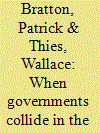

|
|
|
|
|
| Publication |
2011.
|
| Summary/Abstract |
How effective are parliamentary democracies at sending coercive signals and orchestrating them into coherent messages? Are parliamentary democracies any better at doing this than presidential democracies? In order to answer these questions, the research project uses an in-depth analysis of the 1982 Falklands/Malvinas War as a case study. This article seeks to determine how effective the United Kingdom was at sending coercive signals and orchestrating them into coherent messages. In general we observe that the United Kingdom suffered from many of the same problems in executing a coercive strategy as presidential governments do.
|
|
|
|
|
|
|
|
|
|
|
|
|
|
|
|
|
|
|
|
|